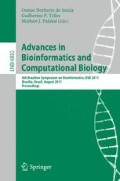Abstract
Bioinformatics experiments are rapidly evolving with genomic projects that analyze large amounts of data. This fact demands high performance computation and opens up for exploring new approaches to provide better control and performance when running experiments, including Phylogeny/Phylogenomics. We designed a phylogenetic scientific workflow, named SciPhy, to construct phylogenetic trees from a set of drug target enzymes found in protozoan genomes. Our contribution is the development, implementation and test of SciPhy in public cloud computing environments. SciPhy can be used in other Bioinformatics experiments to control a systematic execution with high performance while producing provenance data.
This work was partially sponsored by CAPES, FAPERJ and CNPq.
Access this chapter
Tax calculation will be finalised at checkout
Purchases are for personal use only
Preview
Unable to display preview. Download preview PDF.
References
Jiang, Z., Zhou, Y.: Using bioinformatics for drug target identification from the genome. American Journal of Pharmacogenomics: Genomics-Related Research in Drug Development and Clinical Practice 5(6), 387–396 (2005)
Hartman, A.L., Riddle, S., McPhillips, T., Ludäscher, B., Eisen, J.A.: Introducing W.A.T.E.R.S.: a Workflow for the Alignment, Taxonomy, and Ecology of Ribosomal Sequences. BMC Bioinformatics 11(1), 317 (2010)
Dávila, A.M.R., Mendes, P.N., Wagner, G., Tschoeke, D.A., Cuadrat, R.R.C., Liberman, F., Matos, L., Satake, T., Ocaña, K.A.C.S., et al.: ProtozoaDB: dynamic visualization and exploration of protozoan genomes. Nucleic Acids Research 36(Database issue), D547–D552 (2008)
Vaquero, L.M., Rodero-Merino, L., Caceres, J., Lindner, M.: A break in the clouds: towards a cloud definition. SIGCOMM Comput. Commun. Rev. 39(1), 50–55 (2009)
Oliveira, D., Ogasawara, E., Baião, F., Mattoso, M.: SciCumulus: A Lightweigth Cloud Middleware to Explore Many Task Computing Paradigm in Scientific Workflows. In: Proc. CLOUD 2010, Miami, FL, pp. 378–385 (2010)
Author information
Authors and Affiliations
Editor information
Editors and Affiliations
Rights and permissions
Copyright information
© 2011 Springer-Verlag Berlin Heidelberg
About this paper
Cite this paper
Ocaña, K.A.C.S., de Oliveira, D., Ogasawara, E., Dávila, A.M.R., Lima, A.A.B., Mattoso, M. (2011). SciPhy: A Cloud-Based Workflow for Phylogenetic Analysis of Drug Targets in Protozoan Genomes. In: Norberto de Souza, O., Telles, G.P., Palakal, M. (eds) Advances in Bioinformatics and Computational Biology. BSB 2011. Lecture Notes in Computer Science(), vol 6832. Springer, Berlin, Heidelberg. https://doi.org/10.1007/978-3-642-22825-4_9
Download citation
DOI: https://doi.org/10.1007/978-3-642-22825-4_9
Publisher Name: Springer, Berlin, Heidelberg
Print ISBN: 978-3-642-22824-7
Online ISBN: 978-3-642-22825-4
eBook Packages: Computer ScienceComputer Science (R0)

